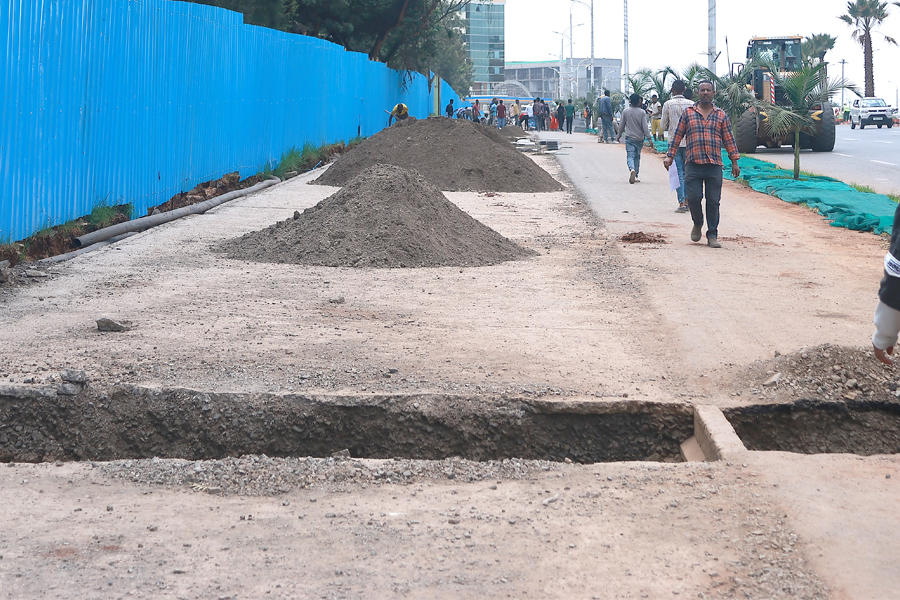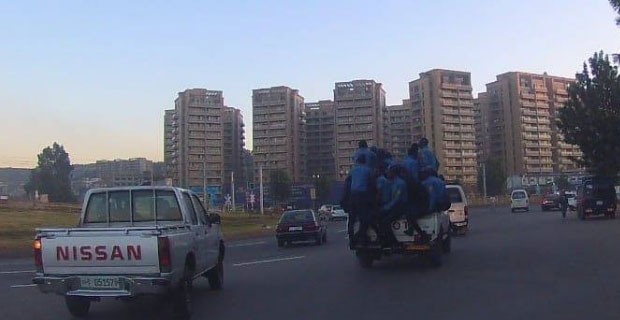
Radar | Jan 28,2023
The Ethiopian Shipping & Logistics Services Enterprise (ESLSE) executives are finalising a deal to acquire nearly 200 heavy trucks for 15 million dollars. The Enterprise’s second attempt is to buy the cargo trucks with a loading capacity of 450qtl each.
A partnership between Sinotruk International and Yemkab General Import & Export Plc secured the deal last week. The companies have agreed to deliver the trucks in four months.
Executives hope the trucks will ease bottlenecks in the logistics corridor, besieged by a shortage of shipping containers and a surge in shipment costs.
“The trucks operating in the country can’t handle the Enterprise’s demand for freight transportation,” said Wondimu Denbu, deputy CEO for corporate services.
The executives had issued a tender last October to buy the trucks but were unsuccessful in striking a deal after many of the 35 companies that bought bid documents failed to place offers. Four were unable to pass the technical evaluation. In March this year, six suppliers submitted offers, and four did not make the technical evaluation.
Sinotruk International, a subsidiary of the Sinotruk Group, manufactures a wide range of heavy-duty trucks, buses, and special purpose vehicles. Established 15 years ago, Sinotruk International has teamed up with Yemkab ImEx, a local company importing construction machinery since 2008.
The latest fleet of trucks will be an addition to the 475 trucks the Enterprise currently operates. After it merged with Comet Transport S.C., the Enterprise acquired half of the fleet six years ago. Wondimu hopes to see the latest procurement speed up inward freight transportation services from Djibouti and reduce demurrage costs. The Enterprise pays 11 dollars for a 20ft container that stays at ports in Djibouti beyond the eight-day grace period. The demurrage cost doubles for 40ft containers.
Logistics jam hold brought on by a shortage of trucks spurred the federal government to commission the construction of the Ethio-Djibouti Railway with 4.2 billion dollars in credit secured from the Export-Import Bank of China. However, the railway transport operational since 2018 accounts for less than five percent of cargoes shipped to and from Djibouti.
Most import and export items are transported by close to 14,500 freight trucks, with a load capacity of more than 250qtl. Nearly 90pc operate under the Ethiopian Transport Employers’ Federation, representing 54 associations in the industry. More than half of these associations work with the Enterprise. They carry a significant volume of 13.6 million tonnes of import and export commodities to and from Djibouti to the seven dry ports. Established in 2009, Modjo Dry Port is the largest inland terminal that hosts 75pc of the 24,000 containers handled by the dry ports.
Due to the foreign currency crunch, few trucks have been imported recently. Last year, the National Logistics Council, a 10-member body, gave the green light to transport associations to import 2,500 trucks to ease logistics hurdles and avoid congestion at ports in Djibouti. Central bank authorities availed foreign currency for the procurement, while the state-owned Commercial Bank of Ethiopia (CBE) facilitated credit for businesses. However, less than 500 trucks were imported through the scheme.
Fitsum Tilahun, an expert in logistics, believes that the latest procurement can improve service delivery across the logistics sector by minimising the Enterprise’s reliance on transport associations.
“Despite their deals with the Enterprise, some truck owners divert to other transport routes for better premiums,” said Fitsum.
The cargo transport rate under the multi-modal system averages 272 Br a quintal. The fare may soar to 350 Br outside the system.
Each year, transport associations participate in a bid to win contracts from the Enterprise. An association proves it has no less than 70 freight trucks with payload capacities of 30tns to bid.
Operating with 220 cargo trucks, Dejen Cross Border Transport Association is one of these working with the Enterprise. Less than a quarter of its fleet meets the Enterprise’s requirement due to truck owners’ failure to renew permits on time, disclosed Dejene Legesse, general manager. The permit renewal service was suspended for almost seven months following the restructuring of federal institutions in October last year. The suspension was a blow to truck owners.
Unique Cross Border Transport Association has 250 freight trucks. Around 36pc of these transport cargo for the Enterprise, with a truck making three monthly trips. However, Haile Belay, general manager, says meeting the requirement is difficult.
“Most trucks can only make two trips,” he told Fortune.
The mandatory transport quota is taking its toll on transport associations. Six months ago, transport authorities imposed quotas on 49 cross-border freight transporter associations to haul cement from factories to the Grand Ethiopian Renaissance Dam (GERD) site in Guba, Benishangul-Gumuz Regional State. Another quota introduced in March this year forces 68 trucking associations to transport half a million tonnes of fertiliser from ports in Djibouti with tariffs ranging from 257 Br to 520 Br a quintal.
The state-owned Ethiopian Shipping & Logistics Services Enterprise operates with a fleet of 475 freight trucks. The Enterprise acquired half of the fleet six years ago.
PUBLISHED ON
Aug 06,2022 [ VOL
23 , NO
1162]

Radar | Jan 28,2023

Fortune News | Aug 25,2024

Radar | Aug 13,2022

Life Matters | Jul 18,2021

Radar | Dec 10,2018

Fortune News | Apr 28,2024

Verbatim | Jan 12,2019

Radar | Apr 03,2021

Radar | Mar 28,2020

Radar | Oct 24,2020

Dec 22 , 2024 . By TIZITA SHEWAFERAW
Charged with transforming colossal state-owned enterprises into modern and competitiv...

Aug 18 , 2024 . By AKSAH ITALO
Although predictable Yonas Zerihun's job in the ride-hailing service is not immune to...

Jul 28 , 2024 . By TIZITA SHEWAFERAW
Unhabitual, perhaps too many, Samuel Gebreyohannes, 38, used to occasionally enjoy a couple of beers at breakfast. However, he recently swit...

Jul 13 , 2024 . By AKSAH ITALO
Investors who rely on tractors, trucks, and field vehicles for commuting, transporting commodities, and f...

Oct 18 , 2025
The political establishment, notably the ruling party and its top brass, has become p...

Oct 11 , 2025
Ladislas Farago, a roving Associated Press (AP) correspondent, arrived in Ethiopia in...

Oct 4 , 2025
Eyob Tekalegn (PhD) had been in the Governor's chair for only weeks when, on Septembe...

Sep 27 , 2025
Four years into an experiment with “shock therapy” in education, the national moo...